The Boston Bruins’ never-ending horror show of injuries continued Monday with the announcement that Brad Marchand will miss time with an upper-body injury. The exasperation Marchand displayed in the aftermath of sustaining the injury by smashing his stick on the bench perfectly summed up the feelings surrounding the club at this point in time.
Despite grabbing at least one point in seven of their last eight contests it’s difficult to feel good about the team’s prospects for the foreseeable future. With Marchand joining David Krejci, David Backes and Ryan Spooner on the shelf the Bruins have lost an astonishing amount of firepower up front. The injuries to Adam McQuaid and Noel Acciari have put a dent in the team’s physicality and penalty killing abilities. Even backup goaltender Anton Khudobin is in ailing health. Those remaining in uniform largely constitute a “who’s who” of fringe players and still-green youngsters.
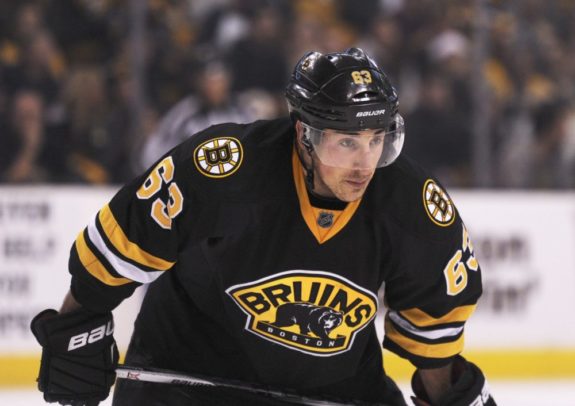
Furthermore, the B’s have yet to string together 60 consecutive minutes of great hockey. Monday night versus Minnesota the team turned in it’s best opening 40 minutes of the season, dominating the Wild in every facet of the game. They went to the locker room, exited 20 minutes later and proceeded to do everything in their power to let their opponent back into the contest.
Two points are two points, and the win was badly needed. But good vibes and confidence moving forward are equally important at this point in time. In once again hanging on for dear life during a game they once dominated, the team likely feels more relieved than exuberant.
With so much production and reliability shelved, Tuukka Rask’s importance has been magnified to previously unforeseen levels. Having previously missed time to injury himself, the Finn’s performance in the coming weeks will be the biggest factor in determining whether or not the Bruins weather the storm or sink into the depths of the NHL’s ocean.
Rask’s Recent Road
Rask’s season got off to an inauspicious start, with several notable hiccups giving way to a concussion suffered in practice. The rocky start raised many of the same questions that have dogged him since Boston’s fall from the NHL’s elite ranks several seasons ago. Since his return, however, he has looked an awful lot like his former self.
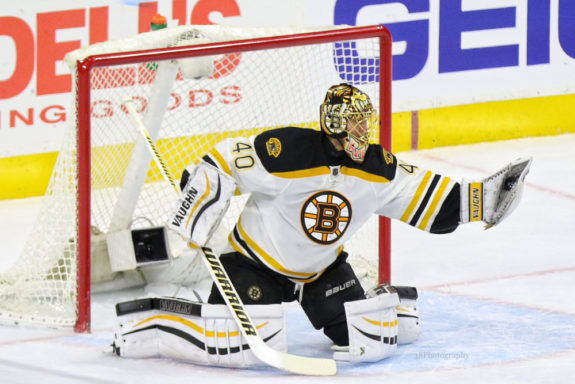
Over his five starts since returning, he’s posted a .922 save percentage and allowed 12 goals. Three of those starts came against teams with offenses ranked in the top ten and two starts featured five minutes of bonus three-on-three hockey. He may not be slamming the door at every turn of the bend but he has certainly kept his team in games. Considering the current circumstances it’s hard to ask much more of him.
Versus Minnesota on Monday night, Rask came up with multiple big saves in the third as his team once again clung to life support. His penalty shot save on Mikael Granlund and multiple stops with Kevan Miller in the box proved to be the difference, with his teammates gifting the Wild with breakaways and defensive-zone turnovers left and right. The loose play in front of Rask inflated his numbers, muddying an honest assessment of his play.
The Road Ahead
Historically speaking, November has been Rask’s bread and butter. He has posted more wins (39), the highest save percentage (.929) and lowest goals-against average (2.05) of his career during the calendar year’s penultimate month.
That’s admittedly a bit of a ‘Bob Costas stat’ – “So and so is batting .300 in the month of September, north of the Mason-Dixon line, when the temperature is below 50 degrees.” It may or may not have any real pertinence to the situation at hand. But with things going the way they are for Boston, you’ll have to excuse me for grasping at straws and trying to find some silver linings here and there.
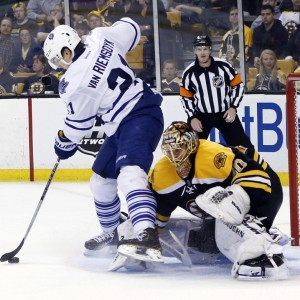
He’ll likely need to replicate those numbers for Boston to not nosedive down the standings over the next two weeks. Though the Rangers current struggles outweigh even Boston’s, a back-to-back versus the high-octane Maple Leafs (second in league scoring) looms large at week’s end.
The Bruins then travel west for the always-challenging California road trip. The Kings boast the best goal differential in the league while the Ducks have historically had Rask’s number; his career record versus Anaheim being a lowly 1-5-1. In fact, he’s posted the worst GAA and SV% of his career versus Disney’s former team.
The Bruins will need the former Vezina winner to be at his best these next two weeks. Should he falter, his team’s “California Dreamin'” could easily become a California nightmare.
How His Teammates Can Help
By comparison, Boston’s blue line is in relatively good shape health-wise. The loss of Adam McQuaid hinders the unit’s physicality and penalty-killing aptitude, but it’s hardly depleted. As such, the defensive-zone play of Zdeno Chara, Brandon Carlo, Kevan Miller and Rob O’Gara will be integral to success. As more “traditional” defense-first players, they will be counted on to disrupt passing and shooting lanes, win battles down low, block shots and ensure that their goaltender doesn’t need to make multiple saves during one sequence.
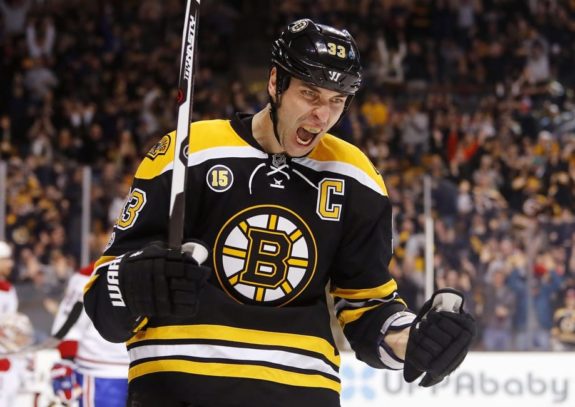
The team will be counting on Rask to make the first save. Their goaltender will be counting on them to clean up.
Charlie McAvoy and Torey Krug will be leaned upon to consistently, successfully break the puck out of the defensive zone. Each have had bouts with consistency to this point, though Krug appears to be playing his way out of an early-season funk.
Both were excellent Monday versus Minnesota, with Krug cracking the scoresheet for the fourth game in a row (two goals, four assists in that stretch). McAvoy was a steady, physical force all night long, registering five hits and a plus-two over 24:35 of action.
Considering the unit’s health and experience (relative to the forwards) the onus falls on defensemen to continue ironing out the wrinkles with the hopes of winning some low-scoring affairs.
Forwards Getting Defensive
Conceding just nine goals to Los Angeles, Columbus, Vegas, and Washington is admirable, especially considering the current set of circumstances. Unfortunately, the Bruins scored just eight themselves over that stretch. Heading into action Monday night the team ranked 19th in league scoring before torching Devan Dubnyk for four goals in forty minutes.
Moreover, David Pastrnak and Brad Marchand have accounted for nearly half of the team’s goals. With Marchand now out indefinitely a precarious situation just became exponentially worse.
As such, a recommitment to team defense is necessary. I’m not advocating for passive hockey, nor am I unaware of the benefits of winning the possession battle. “The best defense is a good offense,” and whatnot. But this lineup, as currently constructed, cannot be counted on to score four goals per game. It’s safe to assume the offense won’t be flowing in the coming weeks. Safe, defensive, even ugly hockey should be Boston’s M.O. moving forward.
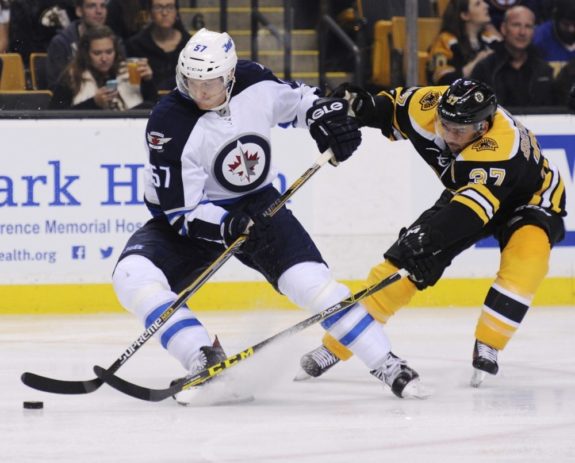
That means clogging up the neutral zone. It means disrupting lanes. It means an increased importance on collapsing lower in the defensive zone and making themselves available to help/receive breakout passes. Before they focus on clean and threatening transition they must first ensure that the puck clears the zone; frustrate the opposition into high-risk plays and opportunistically turn the tables when a chance arises.
It’s a system that worked wonders for Ottawa last season and brought multiple Cups to New Jersey in the 90’s. Tuukka Rask may not be Martin Brodeur but he’s at least a Craig Anderson. Getting the puck out of harm’s way and ensuring opponents are “one and done” should be the top priority.
“Special” Teams
Boston’s special teams have been a bright spot to this point in a still-young season. Heading into Monday’s action the club ranked fourth in the league in both power play and penalty kill percentage. With 15 consecutive kills dating back to the San Jose contest the unit is humming.
The power play was ranked fourth but is moving in the wrong direction. Perhaps the slide is predictable considering the personnel losses, but it has nonetheless fallen on hard times. They’ve converted on just three of their last 17 chances, including Monday night’s debacle. In addition to zero goals in four opportunities, the unit turned completely negative in the third period, giving up multiple breakaways; the second bringing a down-and-out Wild team within one goal.
Though David Pastrnak was able to capitalize with the man advantage late against Washington, the unit failed to cut into a two-goal deficit during a Brooks Orpik four-minute infraction for his usual selective scumbaggery.
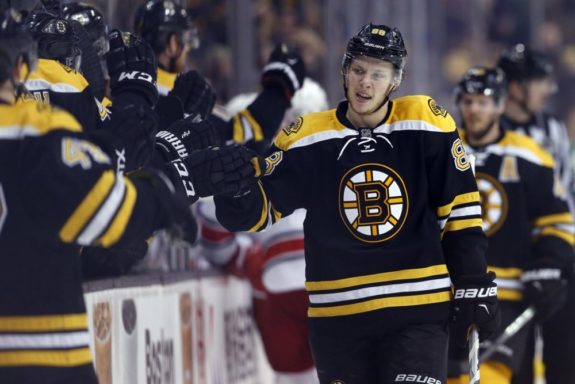
(Side note: It amazes me that he doesn’t receive more negative attention for the manner in which he bullies players half his size while turning-tail when confronted by those in his own weight class).
Once again, the Bruins find themselves in the bottom half of the league regarding power play opportunities. Considering the fact that they will be finding themselves outgunned on a nightly basis moving forward, increasing those opportunities with a tenacious, dogged work ethic is a great way to help balance the scales.
The unit is currently missing significant personnel. Giving the replacements as many chances as possible will be paramount to production. Ceasing to allow multiple shorthanded breakaways per contest would probably help as well…
Cross Your Fingers
There’s really not much else to do in times like these then hope for the best and plan for the worst. Though the schedule is set to condense in the weeks ahead, Boston does have multiple three-day layoffs this month to hopefully mend.
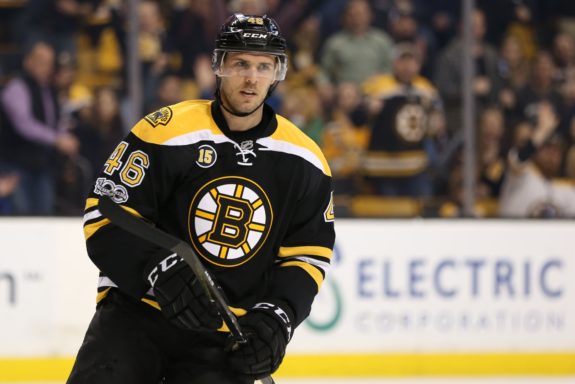
The injury bug has prevented a proper assessment of these Bruins. Twenty-nine different players have dressed in this young season, and the team has played zero games with their full lineup. The results have varied, leading to roughly .500 hockey over the season’s first month.
The question of “Is Tuukka Rask Elite” has followed the Bruins for several seasons now. Should he fail to emphatically prove himself in the coming weeks a .500 record could very well be this team’s high-water mark for quite some time.